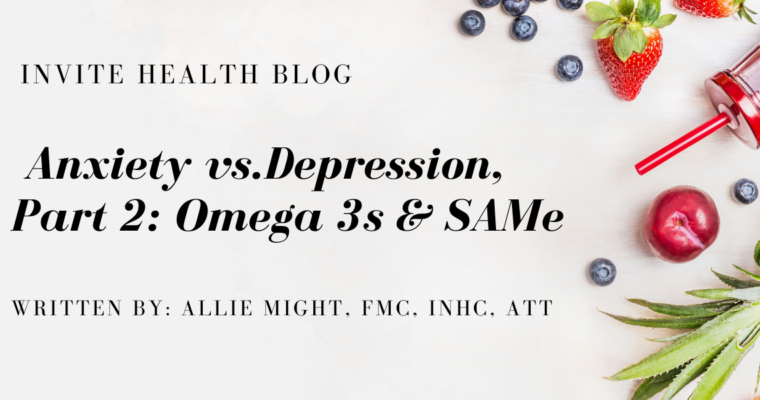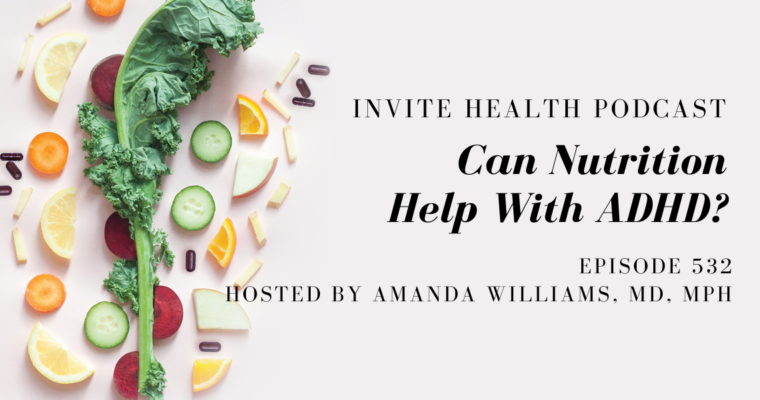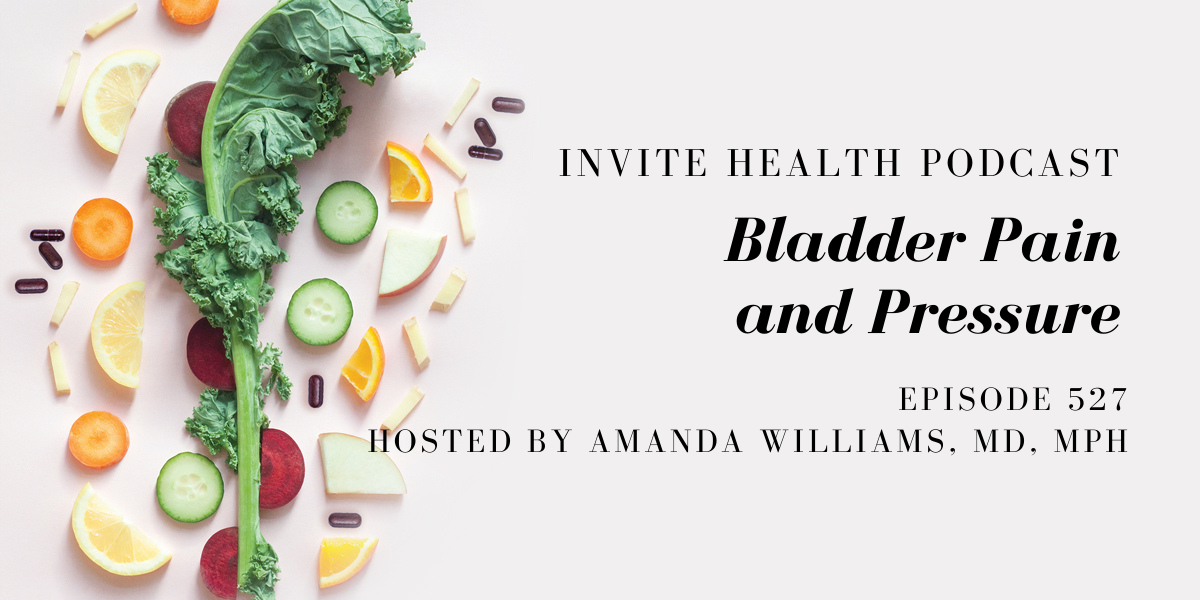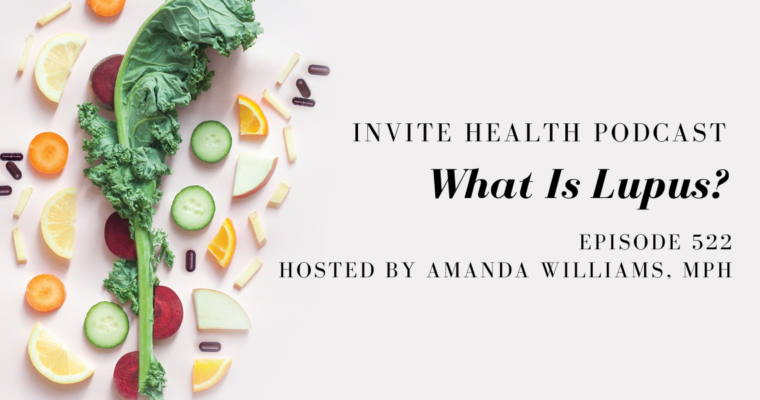bladder
Subscribe Today!
Please see below for a complete transcript of this episode.
Bladder Pain and Pressure – InViteⓇ Health Podcast, Episode 527
Hosted by Amanda Williams, MPH
*Intro music*
InViteⓇ Health Podcast Intro: Welcome to the InViteⓇ Health Podcast, where our degreed healthcare professionals are excited to offer you the most important health and wellness information you need to make informed choices about your health. You can learn more about the products discussed in each of these episodes and all that InViteⓇ Health has to offer at www.invitehealth.com/podcast. First time customers can use promo code PODCAST at checkout for an additional 15% off your first purchase. Let’s get started!
*Intro music*
Amanda Williams, MPH:
[00:00:40] Have you ever heard of interstitial cystitis? This is a common issue that affects mainly women, but can also impact the urinary tract of men as well. And today I want to talk about the details of interstitial cystitis, the symptoms, what you can be doing and just how common this is. So I’m Amanda Williams, MD, MPH, Scientific Director here at InViteⓇ Health. And when it comes to our urinary system, we want to make sure that we are doing the right things when it comes to our fluid intake, when it comes to the right vitamins and minerals, as well as the foods that you eat every day that can really help to optimize and support the health of your bladder.† [00:01:26]
[00:01:27] So we know that the high antioxidant foods are certainly beneficial. Many times people have heard of cranberry, for example, when it comes to bladder health. And we know this to be the case because what the mannose, which is a carbohydrate contained in the cranberry actually does, is it creates a slippery environment within the bladder wall, which makes it very difficult for bacteria to adhere. So when in the setting of UTIs or urinary tract infections, which we know are incredibly common, it’s one of the most common causes for outpatient infections in this country, and the lifetime incidence is somewhere around 50, 60% for women who will experience a UTI throughout the course of their lives. And then you have women who will have recurrent UTIs. Now, as men get older, the prevalence or occurrence rate of urinary tract infections begins to go up because of incomplete bladder emptying, so men are more prone to urinary tract infections as they age.† [00:02:34]
STUDIES SHOW D-MANNOSE HELPS PROTECT AGAINST URINARY TRACT INFECTIONS – INVITE HEALTH PODCAST, EPISODE 169. Listen Now>>
[00:02:35] So we know that this is a common problem, but we also know that there is something known as interstitial cystitis that can really be problematic. And what interstitial cystitis is, sometimes they also call it bladder pain syndrome, but this is a chronic condition, and it’s a feeling of pain or pressure in the bladder area. Some people will describe it even as a burning sensation, but it’s not associated directly with a UTI. So it’s bladder pressure, bladder pain, sometimes it’s just described in general as like pelvic pain. The pain can range from mild and irritating to significant and very severe.† [00:03:20]
[00:03:21] We know that when it comes to interstitial cystitis, oftentimes doctors are at a loss as to what to necessarily do because it’s not like, “OK, well, they have a urinary tract infection. Let’s give them an antibiotic,” because this is not going to create any type of relief for those who are dealing with cystitis. And so cystitis, bladder pain syndrome, kind of the two go hand-in-hand. It’s interchangeable just depending upon how your doctor may describe it to you. But we know that this is a common condition. Initially, they thought that cystitis affected roughly around 2 out of every 100,000, in particular, women. Now they recognize that this is probably more like 10 to 15% of women who experience this problem. And I’ve talked to many women throughout the years, and they’re generally at a loss as to how to manage this because there is no good direct targeted treatment.† [00:04:27]
[00:04:28] So when you look at the pathophysiology of this, it’s even fairly well unknown, one could say, because they don’t necessarily know why it is that women are prone to experiencing this bladder pressure, bladder pain. You know, you can look at pelvic floor dysfunction. We can look at certainly a dysregulated immune system, increase in inflammation in the body. So chronic inflammation can certainly drive this. So you can look at women, perhaps, who have a history of diabetes or high blood pressure may be more prone to developing cystitis. So there are many unknowns when it comes to cystitis, but we definitely know that the prevalence is relatively high. Now, keep in mind, there are many women who suffer with this and even men as well, so this is not just, you know, solely women who experience this, who can have this problem and are never necessarily diagnosed. Maybe they never mentioned it to their doctor, or maybe they don’t see their doctor on a regular basis. But we definitely know that this is a problem not only here in the United States but worldwide. And we can tie those chronic disease states, things like diabetes and kidney disease and, you know, heart disease into putting someone into a greater risk for developing interstitial cystitis.† [00:05:54]

[00:05:55] But what can we do once someone has this? Because at the end of the day, if someone is dealing with interstitial cystitis, they are incredibly uncomfortable and having just this irritated bladder wall all of the time. And this can actually get to the level where it creates scarring within the bladder, which can then really be incredibly problematic. So when it comes to traditional approach, most even urologists are once again at a loss as to how to manage these patients. And so when you look at the, you know, diagnosis and the treatment, they generally once again are looking at, “OK, let’s try antibiotics. Maybe there’s an underlying infection and we’re just missing this and this is what’s creating this inflammation in this pain within the bladder.” But for many people who have cystitis, the antibiotic is not going to do anything because this is not where the problem resides. The problem resides within that oxidative stress and the inflammation. So what we do know is that there are many different nutrients that someone who is dealing with interstitial cystitis can utilize that can provide a lot of support.† [00:07:21]
[00:07:22] We can look at an amino acid known as arginine. L-arginine, we know is very beneficial when it comes to many functions in the body, including blood pressure regulation through its action of releasing nitric oxide. But they did an interesting study where they took a group of people who had diagnosed interstitial cystitis and they gave them 1500mg of arginine daily. And then they assessed if they had any improvement on their pain intensity and the pain frequency, as well as any other urinary symptoms that they may have been experiencing. Maybe that, you know, urge to have to go to the bathroom more often. And what they found was that the group that was given arginine compared to the placebo group did really well in terms of overall improvement across all areas. Now they did another study where they compared L-arginine to a drug called elmiron, and elmiron oftentimes is another one of those go to trial by errors that a doctor may prescribe to someone who is dealing with interstitial cystitis. That’s actually a prescription medication whose indication is to treat bladder pain and discomfort. What we know is that elmiron comes with significant side effects, and there’s actually lawsuits out there against that drug because people who have been prescribed that have actually experienced detrimental effects on their vision and even had, to serious degrees, loss of sight from being on this medication. So OK, well, if the arginine, this amino acid, is working better than the prescription medication, then perhaps that’s what they should be utilizing, right? Well, we know that the arginine can be very helpful and it’s working on a couple of different fronts. Number one, we’re getting better blood flow, oxygenation, targeting oxidative stress, targeting the inflammation within the bladder.† [00:09:32]
STUDIES SHOW D-MANNOSE HELPS PROTECT AGAINST URINARY TRACT INFECTIONS – INVITE HEALTH PODCAST, EPISODE 169. Listen Now>>
[00:09:33] And then we partner this up with omega-3 fatty acids, fish oil in particular. They have looked at dietary intake of those who suffer from cystitis and those who have high amounts of omega-3s in their diet will have a lessening of those symptoms. So as soon as they start to incorporate in things like salmon and walnuts, avocados into their routine, their inflammatory levels in the body begin to go down and they start to get improvement overall within the bladder. So we know that supplementation with fish oil is also incredibly beneficial for anyone who is dealing with that type of bladder irritation or bladder pain that is not associated with a urinary tract infection.† [00:10:18]
[00:10:19] Now here’s another little fun tip is quercetin. That powerful bioflavonoid has been shown in clinical trials to be very, very powerful when it comes to patients who have interstitial cystitis. So all of those symptoms that are driven up because of the inflammation. We know that when you have foods that are high in quercetin, things like broccoli and onions and blueberry, that this is going to lower the inflammation in the body. But when we take quercetin as a supplement, they have been able to show how it could actually reduce pelvic pain. And this was shown in men who have prostatitis, so inflammation within their prostate, but also in patients who have interstitial cystitis.† [00:11:06]
[00:11:07] Now, I oftentimes will even partner the quercetin up with bromelain. Remember, bromelain is coming from the stem of the pineapple. I have found that many folks who deal with cystitis and are in this chronic state of discomfort that when they include in quercetin along with bromelain, bromelain, taking that on an empty stomach around 1000mg twice a day, quercetin at least 1000mg per day, and then the fish oil at least 2000mg of your omega-3s per day, and then we look at the arginine, at minimum, we want to be using 1000mg per day, upwards to 2000mg per day. This can really yield an awful lot of support for someone who is dealing with that chronic bladder pain, pressure and discomfort.† [00:11:58]
[00:11:59] And you think about other things that we need to create balance in. So if someone has low Vitamin D, low magnesium, these can also be driving reasons that are exacerbating that pain and inflammation within the bladder. So it’s a comprehensive approach, but it’s definitely much more manageable than traditional doctors lead on to, to believe because they never look at the foods, they never look at supplementation. And we definitely can see through scientific research that when it comes to getting interstitial cystitis under control, that there are many different nutrients and lifestyle modifications that can certainly lead you to a point where this very debilitating at times problem can be managed, controlled and not be that pain in your bladder.† [00:12:56]
[00:12:57] So that’s all that I have for you for today. I want to thank you so much for tuning in to the InViteⓇ Health Podcast. Remember, you can find all of our episodes for free wherever you listen to podcasts or by visiting invitehealth.com/podcast. Now, do make sure that you subscribe and you leave us a review. You can follow us on Facebook, Twitter and Instagram, and we will see you next time for another episode of the InViteⓇ Health Podcast.† [00:12:57]
*Exit music*








